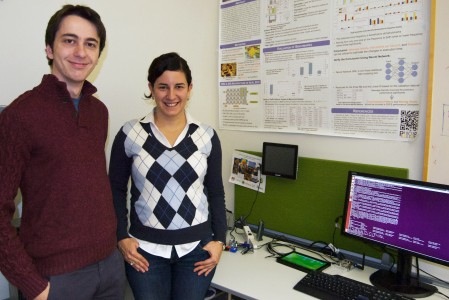ECE PhD Student Wins ACM Research Competition in Design Automation

ECE PhD student Onur Sahin won first prize this November at the Association for Computing Machinery’s (ACM) Special Interest Group on Design Automation (SIGDA) Student Research Competition. Sahin, who is advised by ECE Professor Ayse Coskun, won for his project on providing sustainable performance to mobile device users, titled “Pushing QoS-Awareness into Thermal Management for Sustainable User Experience in Mobile Devices”
Sahin soared through the competition’s multiple rounds at the International Conference on Computer Aided Design (ICCAD) in Austin. Contestants had entered by submitting a write-up describing their research focuses, the novel aspects of their approaches and the impact their projects could have on society. Sahin was among the 20 entrants invited to the poster presentation at the ICCAD, and the five subsequently selected by industry and academic judges to proceed. Those five delivered 10-minute presentations before a judging panel, where they were assessed for their knowledge of their areas, contributions of their research and the quality of their presentations. Judges named Sahin winner following this round.
Sahin’s project idea is a response to modern mobile devices that have significantly increased computational abilities, but generate significant amounts of heat and power dissipation. Unlike other computation devices, mobile devices’ limited battery-life and small size limit their cooling capabilities. This poses a problem for the many users who run computationally intensive applications – like gaming, browsing, media and data processing – for extended durations.
Currently, mobile devices employ a thermal throttling mechanism to slow the devices and reduce their temperatures. However, this reduces performance levels and degrades the user experience.
Sahin’s project addresses the drawbacks of current thermal throttling techniques to mitigate thermal limitations on smartphones. By instituting techniques that prevent an application from boosting performance beyond what is actually required to run that application, Sahin proposes that heating can be slowed. This will allow users to interact with their devices for longer at higher performance levels. Having experimented with real-life smartphones, Sahin and his team reassure that their technology can be easily integrated into current mobile devices.
This competition is one of the several student research competitions annually co-located with ACM sponsored conferences. Each conference focuses on a different major area of computing. The competition is sponsored by Microsoft Research and allows undergraduate and graduate students across computing disciplines to gain visibility for their research projects and finesse their abilities to effectively communicate their ideas.
Sahin will join winners from all conferences to compete in the ACM Grand Final against researchers from all computing areas. From there, the top three contenders and their advisors will receive formal recognition at the ACM Awards Banquet, where the Turing Award – the highest distinction in computer science – is presented annually.